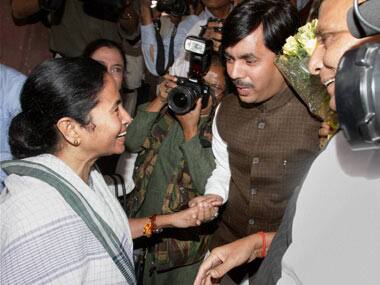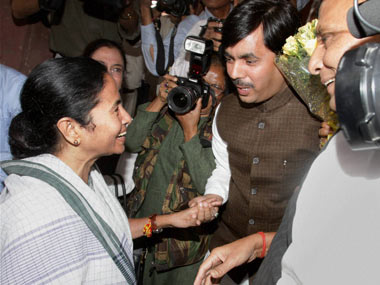“Now, I give you fair warning,” shouted the Queen, stamping on the ground as she spoke; “either you or your head must be off, and that in about half no time! Take your choice!” – Alice’s Adventures in Wonderland. “What I am saying is there should be some respect..,” said Mamata Banerjee, striking an uncharacteristically subdued note on her damage control tour of Delhi’s television studios. But is it too little, too late? In popular imagination Mamata is looking more like Alice in Wonderland’s Red Queen these days – arbitrary, hot-tempered and ready to fly off the handle at the drop of a hat. West Bengal’s urban middle class, a hesitant convert to the Mamata mantra, seems exasperated with “that” woman. Nil, one half of the Dev r Nil designer duo, circulated an open letter to her via Facebook.
As an ardent supporter of change I was vocally campaigning for you during the elections on facebook, addas or on SMS… Against all the catcalls from people for supporting you I believed in you as a leader and I still do to a certain extent.
Then he launches into a laundry list of the madness of Mamata: the Rabindra_sangeet_-blaring traffic signals, the cheap-looking Trident street lights, the blue-wash of the city, l’affaire Trivedi. [caption id=“attachment_250098” align=“alignleft” width=“380” caption=“When Mamata Banerjee stormed into power the hope was that she would not be straitjacketed by ideology (after all she had been quite promiscuous in her political alliances) but be a more commonsensical leader, guided by ruthless pragmatism. PTI”]
 [/caption]
[/caption]
The list of BUTS are becoming longer and it’s not even 10 months of your administration. I hope you realize that the public who got you into power is seething with in disgust and anger, they are all now asking you Why??
Indeed, why this Kolaveri? Confessions of a paranoid mind When Mamata Banerjee stormed into power the hope was that she would not be straitjacketed by ideology (after all she had been quite promiscuous in her political alliances) but be a more commonsensical leader, guided by ruthless pragmatism. “Mamata’s lack of discretion has let down a lot of our expectations,” says Rony Patra, a Masters student at Presidency University in Kolkata. “What is sad to note is that she has become just like Buddhadev (Bhattacharya). She started out by listening to the right people but has slowly become surrounded by yes-men.” Unlike other imperious leaders, Mamata is very accessible, spurning Z-level security, walking on padayatras rather than riding a jeep. But paranoia and imperiousness, my way or the highway, are very much part of her public image. She is seen as a woman who inspires fear more than respect, even among members of her own coterie. Her junior minister Sultan Ahmed was offered an airlift back to Delhi from the Akhilesh Yadav inauguration by the Congress’ Pawan Bansal. But when it was time to leave, Ahmed was nowhere to be found. “I was offered a ride by Bansal,” Ahmed told The Telegraph. “But I avoided.” Still stinging from the Trivedi “betrayal”, he didn’t want Didi to even think for a moment that he was hobnobbing with the frenemy. Mamata has proven to be as shrill in power as she was in opposition, dismissing rape cases as fabricated, muttering about conspiracies around every corner, calling for her own minister’s head. “She sees every reversal, anything negative as a conspiracy,” says Monobina Gupta, author of Didi: A Political Biography. “But the conspiracy theories, which might now sound absurd, were not always so absurd.” Gupta says there is a context to her paranoia. Not just the CPM, but the entire West Bengal Congress unit was once against her. Mamata fought them all. And it’s clear the entire Dinesh-drama played out with the blessings of the PM and the Finance Minister while she was in the dark. Just because you’re paranoid, it doesn’t mean they aren’t out to get you. Didirailed The one word headline splashed across The Telegraph the day after Dinesh Trivedi’s railways budget bomb put it succinctly: DIDIRAILED. For all her reputation for paranoia, Mamata was sold out by her own minister in full view of the nation. In fact, in the Curious Case of the Rebellious Railways Minister, Mamata, irrational and trigger-happy as she can be, was more sinned against than sinning. Dinesh Trivedi might have put together a budget that was good for the railways but it ran against everything his party and his party boss stood for. Trivedi knew it. That was why he okayed the budget with the Finance Minister but blindsided his own party chief. It was not a budget Mamata wanted around her neck when she went into panchayat polls with the CPM baying for her blood. Mamata does not shy away from a fight. But this was one fight she could have lived without. The debacle that ensued, however, showed one thing – Mamata’s strong arm tactics with her own allies in the government, her unceasing high-pitched tantrums have left her very little wiggle room to back out of sticky situations like this. She has become the Mistress of No, the rail budget seen as just the latest in a parade of grenades she has tossed in the government’s path. “Her policy is to put pressure constantly on the central government,” says Subrata Hore, associate professor of political science in Kolkata. “She wants the Congress to be constantly on tenterhooks. But it’s only stick and no carrots.” Mamata has now shown Delhi who’s boss. She just off-handedly dismissed the Congress’ request for support for one measly Rajya Sabha berth from Bengal. But can she bring home the bacon? This is now Mamata Banerjee’s great predicament. She got her way with the railway minister but the Centre has not given her what she really wants – debt relief. Without that all her dream projects from Jangal Mahal to Gorkhaland are stymied. The Bengali daily Bartaman pointed out in an editorial that Mamata had threatened dire consequences if the budget did not include any special packages for Bengal. Well, it did not and her party, its hands full with Dinesh Trivedi, meekly described the budget as “tolerable.” “There was certainly not as much rain, as there was thunder,” said Bartaman. “Her success also shows the limits of regionalism,” says Subir Bhaumik, the editor of Seven Sisters Post in Guwahati, and a long time Bengal politics watcher. “At the end of the day if you don’t have the centre with you, you are screwed.” Continues on the next page The aluminium spoon family Yet those who think that Bengal’s stormy petrel has flown too close to the sun underestimate her. “She has a huge mandate and she knows that for five years she is absolutely safe,” says Monobina Gupta. The party goers in Kolkata might chafe at her midnight curfew on the city’s night clubs (her solution to the rape), but Mamata does not really care. She still lives above the slums in the by lanes of Kalighat, overlooking the fetid Adi Ganga nullah and the red-bricked Alipore Jail. “Hum common people rahega, rahtey jaaonga,” she told Rajdeep Sardesai. “We are not from the golden spoon family. That’s why they hate us.” Mamata Banerjee’s support base has never been the wishy-washy middle class. “They want middle class things – good markets, no load shedding, no crime,” says Hore. “The middle class wants her to react rationally. The crisis of the poor is different. She reacts emotionally to them. She will hug a poor person to her. She will talk in their language. And it is genuine.” The Bengali daily Ananda Bazar Patrika recently carried a story about a fisherman in Midnapore who was a staunch CPM activist. Mamata showed up in his village and saw the land seizure notices from the local bank. She pulled them down with her own hand. The man is now her Number One fan. “That is her constituency,” says V Ramaswamy, longtime grassroots organiser and member of the Calcutta Research Group. “She has not unsettled her constituency.” In fact, what she has done in West Bengal is out-Lefted the Left, using their language, co-opting their issues. “She is a termite out to destroy the CPM by boring them hollow,” says Ramaswamy. “From her grassroots point of view, what she has done is more than any of the Leftist political parties have ever done. The leftist point of view has never been as centre stage as it is now.” Aami Duronto West Bengal has a long history of maverick Congress leaders who revolted against the High Command from Chittaranjan Das and his Swaraj Party to Subhas Bose and even Pranab Mukherjee with his short lived Rashtriya Congress. But Mamata is a class apart. “Mamata’s achievement is that in twelve years she has made Congress the junior partner. She calls the shots,” says Bhaumik. “It is a victory for Bengali regionalism. Even Subhas Bose could not do it.” But is it good for the country? “She does not have to bother about the nation,” says Ramaswamy. “She has to bother about her class. She is not a pretender. She is lumpen and she is subaltern.” Looking at the larger picture, Hore says, “The minus is there will be more conflict among the regional parties all trying to get more help from a weak centre. The plus is they may actually look after their states better.” The states’ grievances against the centre are not new and they go beyond the economic says The Telegraph.
Many of the states are victims of the Centre’s arbitrariness and its propensity to concentrate on Delhi. From museums to Commonwealth Games tto the regional headquarters of public institutions – all are in Delhi… Moreover, welfare schemes spawned in Delhi have their financial burdens passed on to the states: Delhi’s dreams are subsidized by the states’ exchequers.
Now the national parties are losing their sheen. The regional parties have more of the people’s trust. It’s too early to tell whether that will be for better or for worse. But one thing is clear — regionalisation is here to stay for the near future. As is Mamata. Despite Dinesh Trivedi’s moment in the sun and dissident Trinamool MP Kabir Suman’s open letter criticising the “musclemen running amok in the party” Mamata faces no real danger of revolt from within. Mamata’s greatest enemy is quite literally within, writes The Statesman’s editor Ravindra Kumar.
When there is need to fence, she swings a club; when a scalpel is needed, she reaches for the sledgehammer.
“A political observer told me this about her,” says Bhaumik. “Eto boro netri, thaamtey paarbey to? Such a big leader. But does she know when to stop?” Somewhere over the summer, as she dodges questions about mid-term polls and UPA snubs, Mamata Banerjee will have to answer that question. That will determine if Bengal’s chief minister is a Duranto Express or a runaway train.
)